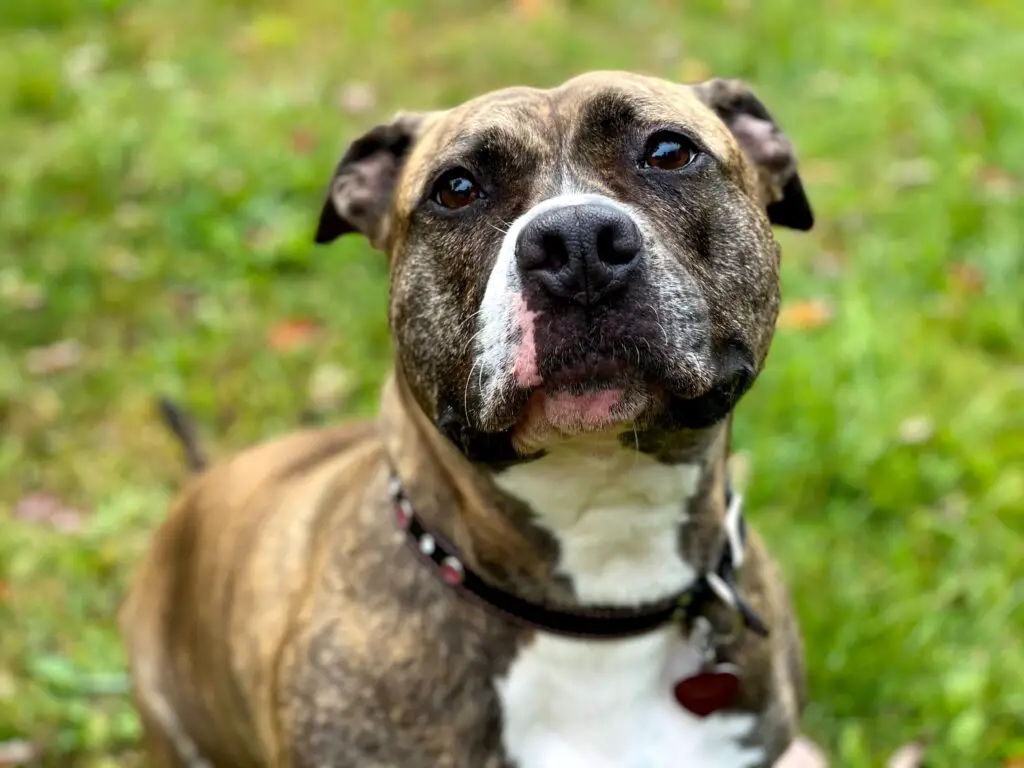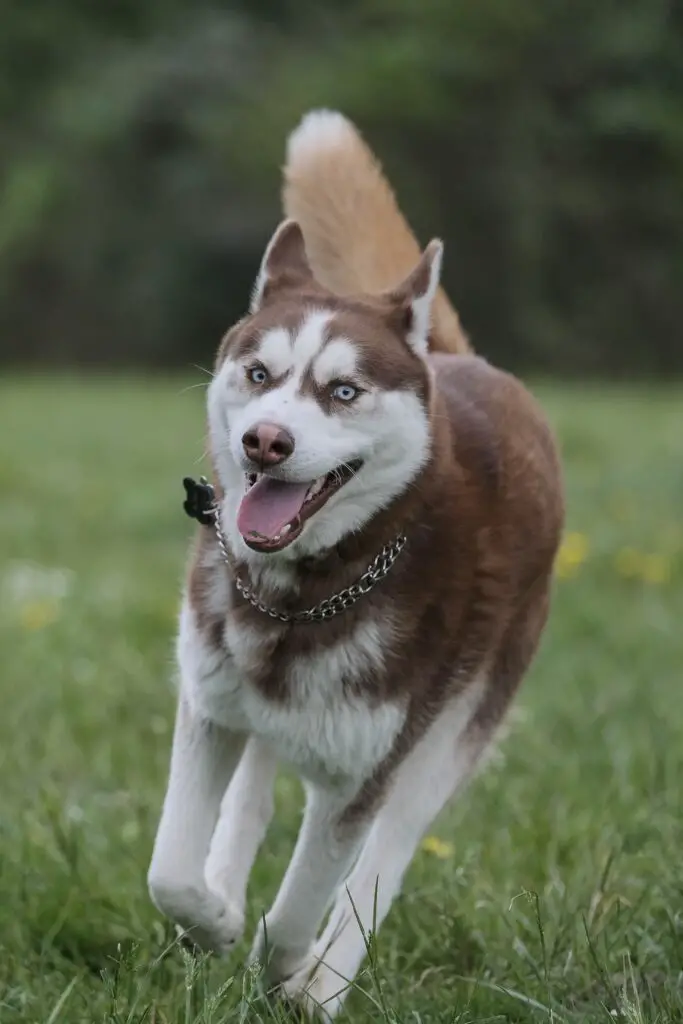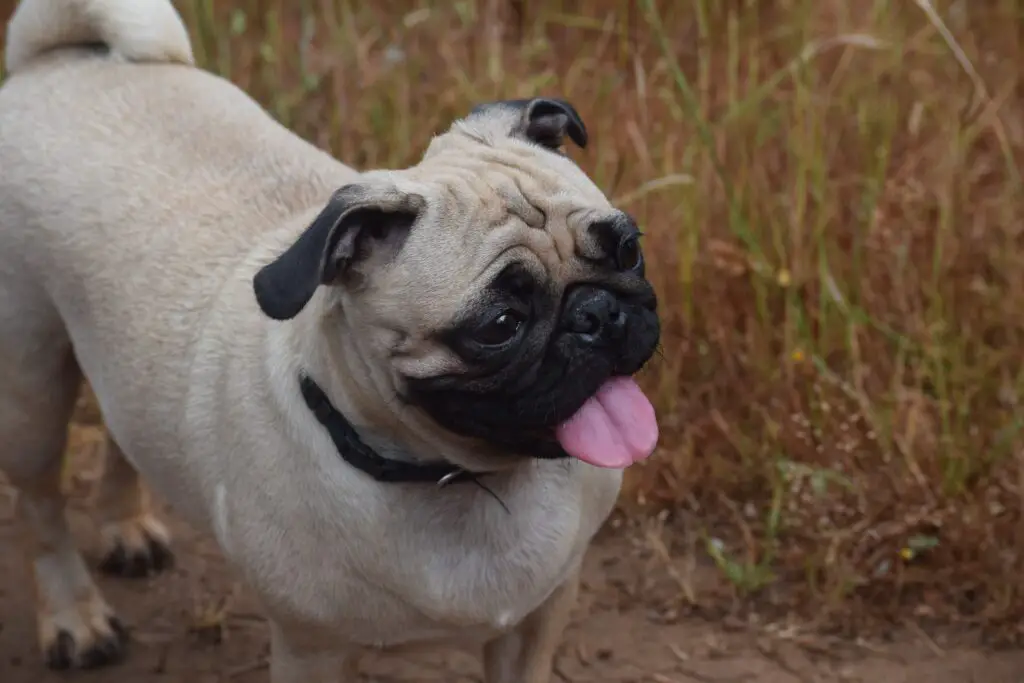It is not uncommon for a dog to sneeze. However, dog owners want to know why is my dog sneezing a lot? It could be simply a normal occurrence, or excessive sneezing could be a symptom of other concerns.
Dog breeds that are susceptible to sneezing are brachycephalic or flat-faced dogs. This would include common breeds like the English Bulldog, Boston Terriers, and Pugs.
In this article, it will explain the common question of, why is my dog sneezing a lot? There are eight main explanations for why dogs sneeze in excess.
Why is My Dog Sneezing A lot? 8 Reasons to Explain a Dog’s
Excessive Sneezing
Allergies.
Canines can develop environmental allergies sometime between the ages of one and three years old. Sneezing is one of the symptoms of allergies. Other signs and symptoms include watery eyes, runny nose, scratching, licking their paws, ear infections, itchy skin, and hives.
What triggers environmental allergies in dogs? Tree pollen, grass pollen, weed pollen, mold, and dust. The reasons dogs develop allergies is due to their immune system overreacting to something in their environment.
Related Articles:
Best Artificial Grasses For Dog Potty

Antibodies in your dog’s system treat these everyday substances as dangerous. The body’s natural response is to release histamines. The histamines are what cause the redness, inflammation, itching, irritation, and lots of sneezing.
Reverse Sneezing. A common enough type of sneezing found in dogs. It is technically called paroxysmal respiration. It happens when your dog is trying to rapidly suck in air through their nose instead of blowing it out.
It is the opposite of sneezing and sounds like your dog is honking. Dogs with long noses are more susceptible to reverse sneezing. Dog owners are concerned because it appears your dog is having difficulty breathing.
What triggers reverse sneezing? It could be a response to excitement, irritants in the environment, such as pollen, or inflammation in the nasal passages. Nasal mites and nasal tumors can be other contributor to reverse sneezing.
When you are concerned about your dog sneezing a lot, especially reverse sneezing, stay calm. Rub your dog with a flat hand and try to calm them down. Usually once they are calm the sneezing will stop.
Communication Sneezing. Dog owners question what is happening when their dog sneezes a lot while playing. You see your dog seemingly enjoying themselves when they meet and greet another dog, but they sneeze every time.
Sneezing is a form of communication between canines. It is a sign of happiness and playfulness. Your dog is communicating they are friendly and welcome play with the other dog. Dogs can sneeze when they are excited and having a good time as well.
Your dog might also sneeze in the presence of another dog to get attention. They are communicating they want to be noticed in a friendly way.
Foreign Body Irritation. If you are still asking why is my dog sneezing a lot, could be due to a foreign object in their nasal passages. A dog that is concentrating on sniffing can have quite the draw for unwanted objects.
Related Articles:
Best Foods for Hiding Dog Pills In
How to Build an Outdoor Dog Potty Area on Concrete
Top 5 Best Halloween Costumes for Dogs

Related Articles:
Your dog will try to expel the objects with rigorous sneezes. Foreign bodies that could trigger a lot of sneezing would include pieces of sticks, leaves, blades of grass, and foxtails. Many of these foreign objects can make your dog uncomfortable and continue to sneeze.
If you live in an area where foxtails grow, take extra precautions. Foxtails are a grass that has tiny seeds at the tip. These tiny seeds are called seed awns, and each one has several barbs at the end intended to borrow in the ground.
When a foxtail seed is inhaled by your dog, it can cause a lot of sneezing and discomfort. Unfortunately, the barbs can borrow in the dog’s nasal passages making it impossible for the dog to remove naturally. Depending on the depth of the foxtail barb you will determine if you can remove it at home or it requires professional care.
Irritants in the Environment. Why is my dog sneezing a lot after having been outdoors? Dogs can breathe in irritants from the environment that cause repetitive sneezing.
Pollen floating around in the backyard or at park can cause sneezing. In some community’s people might burn leaves or brush causing your dog to breathe in smoke.
The reason for a dog sneezing a lot can be due is small particles can get trapped in the dog’s nasal passage which triggers a sneeze. Irritants in an indoor environment that can cause dogs to sneeze are candles burning, perfume, cologne, artificial air fresheners, and cleaning products.
Nasal Infection. When asking why is my dog sneezing a lot, and it has a decreased appetite, or nasal discharge, there is possibility your dog has a nasal infection. A fungal or bacterial infection can cause a nasal infection. The biggest culprits are infected teeth. Your dog will need to be examined by a veterinarian or canine dental specialist.
Another reason for a nasal infection could be an upper respiratory infection. An infection of this nature is normally caused by the dog contracting a virus.
If your still asking why is my dog sneezing a lot and they are pawing at their face, it could be due to an infection in the nasal passages or sinusitis. It would be best to contact your veterinarian to get your dog examined.

Related Articles:
- Ultimate Guide: How To Take Care Of A Senior Dog
- The Benefits of Owning a Dog
- Top 12 Tips for First Time Dog Owners
Tumors in the Nasal Passage. Senior dogs can be more prone to nasal tumors. When dog owners are asking why is my dog sneezing a lot, tumors in the nasal cavity are possible.
Symptoms of nasal tumors include frequent sneezes, nasal discharge, nose bleeds (often on just one side), facial deformity and possible neurological signs.
Nasal tumors can be found in the nasal cavity and paranasal sinuses. They account for 1% of all cancers found in dogs. Your veterinarian can do a physical examine as well as get a tissue biopsy.
Nasal Mites. Canine nasal mites can affect dogs worldwide. Symptoms can include frequent sneezing, reverse sneezing, nasal discharge, and nose bleeds. Your dog might paw at their face, as their nasal passages will be irritated and uncomfortable.
Dogs can get nasal mites directly from digging in the dirt or indirectly from coming into contact with another dog that has them.
In order to relieve your dog of these insects your veterinarian will need to examine your dog’s nasal passage. It is important to get your dog diagnosed and treated as a nasal mite infestation can lead to respiratory issues. Anti-parasitic medicines are relatively effective in treating nasal mites.
Why is my dog sneezing a lot? The most common reasons from the list above include nasal foreign body irritation, tumors in the nasal passage and nasal mites. If you find your dog will not stop sneezing, contact your veterinarian right away.
Related Articles:
- A Review of the 4 Best Dog Shampoos for Itchy Skin
- Can You Use Neosporin On Dogs?
- How to Get Rid of Dog Warts at Home
Why is My Dog Sneezing A lot? Symptoms that Accompany a Dog Sneezing a lot
When sneezing is not your dog’s only symptom, it could be one of the following:
- Sneezing and Coughing. Dogs with weakened immunity are susceptible to canine sickness such as canine influenza, kennel cough, bacterial infections, and even respiratory-type illnesses.
- Wheezing with the Sneezing. When your dog sneezes and you also hear they are having difficulty taking a full breath. You might also hear a wheeze or whistle when your dog breathes. Sneezing that accompanies wheezing could be a potential respiratory sickness or emergency.
- Your Dog Sneezes out Blood. When your dog sneezes blood out of one or both nostrils it is time to contact a veterinarian. Blood is usually an indicator that something serious is going on inside the nasal passages. The most common reason for sneezing blood is foreign bodies irritating their nasal cavity, nasal tumors or bacterial or fungal infections.
Why is My Dog Sneezing A lot? What can Dog Owners do for a Dog Sneezing a lot?
For dogs that have occasional sneezes, it could simply be the cause is an environmental irritant. Take note of the time of year, are the trees release pollen or is your neighborhood smokey.
It will be helpful to both you and your veterinarian if you can keep a journal of when you first noticed your dog sneezing a lot. In some cases, it is best to see a professional and have them examine your dog.
Bring your dog to a veterinarian if your dog has any of the following symptoms with the sneezes:
- If you notice any thick nasal discharge
- Your dog’s nose looks deformed
- Nasal swelling
- Fever or reduced appetite
- Frequent sneezing without any reason or cause
- Sneezes accompany allergy symptoms like itching, licking, scratching, coat changes, or lethargy.
Related Articles:
Best Waterless Shampoos for Dogs
Top 12 Tips for First Time Dog Owners
How to Keep Your House from Smelling like Dog
How to Cook Marrow Bones for Dogs
How to Train Your Dog with Positive Reinforcement
Why is My Dog Sneezing A lot?
Dog’s sneezes are similar to human’s sneezes. Observe your dog and your environment. If the grass and tree pollen is high in your area, it could be irritating your dog’s nasal passage.
People that like to take their dog’s hiking should be aware that foxtails, grasses, and other items in the natural environment could cause dogs to sneeze. Dogs naturally try to sneeze the irritants out of their nasal passages.
Senior dogs can have issues with nasal tumors. When your senior dog suddenly begins to sneeze a lot, take note, and contact your veterinarian for a precautionary examination.
When it comes to reverse sneezing, it is important to stay calm and be supportive of your dog. Enjoy your canine companion and when they begin to sneeze a lot, be wise and know when to seek out professional advice.
Please read our Legal Disclaimer.

